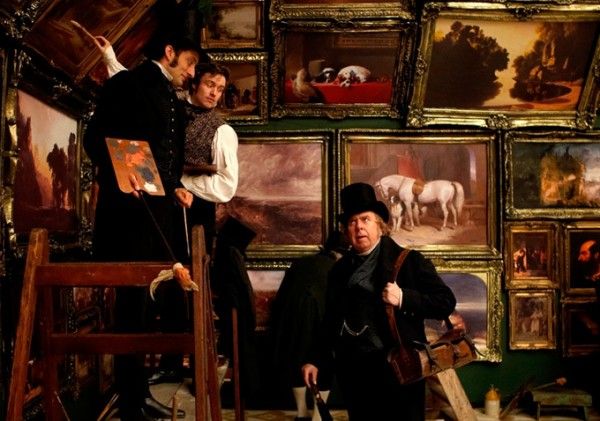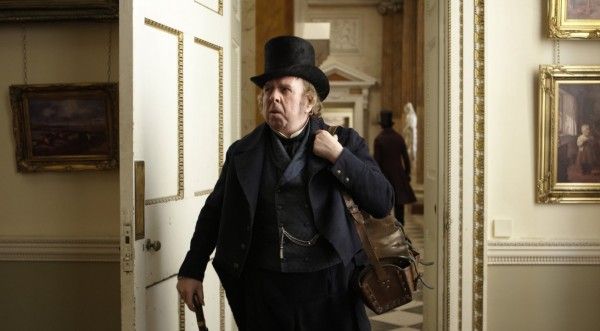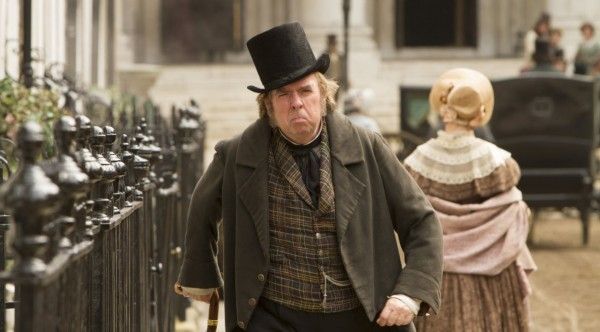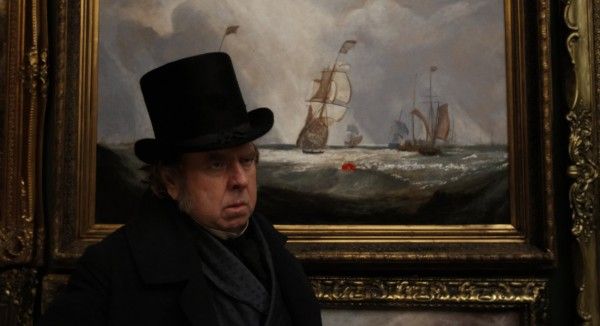Timothy Spall paints a fascinating portrait of J.M.W. Turner in the new biopic, Mr. Turner, written and directed by acclaimed filmmaker Mike Leigh and beautifully lensed by cinematographer Dick Pope. The actor fully immerses himself in the role of the eccentric but brilliant English painter, water colorist and printmaker who elevated the art form of landscape painting in the 18th century. Mr. Turner premiered at the 2014 Cannes Film Festival where Spall took the award for Best Actor and marks the seventh time in his career that he has collaborated with Leigh. Dorothy Atkinson, Marion Bailey, and Paul Jesson also star.
At a recent roundtable interview, Spall talked about the challenge of playing the artist, his preparation for the role, the directing process with Leigh, their organic approach to building up the characters through improvisation, his painting lessons with British portraitist Tim Wright that helped him portray Turner convincingly, how he captured the extraordinary physicality of the character and used his voice to convey Turner’s implosive nature as well as his explosive expression when it came to his art, how his close brush with leukemia altered his outlook on life, and his upcoming TV mini-series, The Enfield Haunting. Check out our interview after the jump:
This is the most stunning performance. I’ve admired your work for so many years. I felt like I was truly immersed in the time period and that you were Turner.
SPALL: I don’t know what to say but thank you. I’m touched by that. It was a great journey to go on. What was great about it was working with Mike for the seventh time. It’s the culmination of a 33-year relationship. For him to have asked me to have done it in the first place was great, but I knew it was going to be. It wasn’t going to be a conventional journey.
How challenging was it and what did you do to prepare yourself to essentially become Turner?
SPALL: Well, I don’t know how much you know about how Mike works, but he doesn’t mind people talking about it, because he has a very particular modus operandi and a formula that he’s invented, which is you bring the work. The work is made up basically. You start with nothing. He’s very, very blatant about that. He says, “Here we all are together. In a year’s time, I hopefully will have a film.” Most of his films obviously, 80 percent of his films, are contemporary pieces, this being his third period piece, but his second period piece based on somebody that existed. What he does is he uses, as I say, this technique where you come to the characters through improvisation. You create a proto human being out of people that you’ve encountered in your life, and you start building up this person and start becoming this person. He’s doing that with all the other actors. Then, you start to form that person, in this case trying to make this person reach towards the research that you’re discovering about the character of Turner. You spend a helluva lot of your time reading, discovering, observing, going through the work, and looking at the extant material, the eyewitness accounts of what he looked like and what he spoke about. You’re trying to form this human being that will fit the bill, and the human being becomes a hand and the research is a glove, and you try to bring this character together into the research, mesh it and create this person that is the sum total of all that endeavor.
Mike is doing that with everybody individually as well. As the great original dramatist that he is, he’s working on forcing you towards a way of making this eventually be a film. What you’re going to do is you create a whole parallel universe which you start becoming Turner world in, and you start living in real time in this world in a rehearsal situation. You start putting on the clothes. We built a whole studio that we could rehearse in. It’s an organic process. You invent this massive lagoon of information without any pressure to do anything apart from create this person, a person that might fit the bill that is the character that is emerging from the research. You try and bring this together and hopefully we did, I suppose, because there’s a film out there called Mr. Turner. (Laughs) And it’s the sum total of that in an essence.
You also took lessons with artist Tim Wright who taught you how to actually paint a Turner masterpiece?
SPALL: Well, I don’t know about that. (Laughs) That’s too complimentary. What I did was Mike asked me when he told me that he was going to pull the trigger on a project, he said, “We’re going to make a Turner film.” This was in 2010. “I’m going to get the money. I don’t know what it’s going to be about, but it’s going to be about Turner. Don’t get excited because it’s three years’ time and it might not happen anyway, but why don’t you go away and learn how to paint for a couple of years?” So I said, “Alright.” In between other jobs, I would go back to Tim Wright. He’s a very talented portraitist and teacher, and he taught me, and basically he gave me a personal fine art foundation course where we did all the elements. Eventually he guided me towards how Turner works and we started looking at that. Then, it culminated in me ending up attempting a couple of copies. We ended up doing the one, Snow Storm – Steam-Boat Off a Harbour’s Mouth, which I’ve got on my wall at home. I look at it and I think, “How the hell did I do that? I certainly couldn’t do it again.” But as the old saying goes, there’s nothing like the knowledge of being hanged in the morning to concentrate the mind wonderfully.
Can you talk a little about the physicality of the role and what went into preparing that? There’s always the sense that we’re in a different era. It’s partly the way you walk, the mannerisms, the vocalization and those deep gruff sounds.
SPALL: Again, that grows out of the organic process of building up the character with Mike. You do use these people which are the prototypes that become the composite, the amalgam. You alchemize these characters into one person as it were. And so, all the time you’ve got an eye on the physicality. We looked at pictures and we read about descriptions of what he was physically. He had this certain look, this certain hunched quality, a certain implosive nature. We worked on that right from the beginning that he was physically very particular. We started working on that. We did him right from when he was a young man, and we got up and walked about and did him and walked up until he got older and older. Obviously, the film is about the last 25 years of his life, so he ages as he gets this odd swagger that turns into this even more odd position. He was very hunched and oddly physical, almost a person that was in a sense implosive in his nature and implosive in his body, but actually explosive in his expression when he comes to his art. It was almost like we were trying to build a character that was sucking everything in so he could shoot it all out. That’s how he expressed himself.
What that grew out of was we were working on somebody who had this massive understanding, this ability to see things and feel them. But rather than share them, what he does with them we discovered, and as the character grew organically, he sees them, understands them, computes them and sucks them inside himself. He’s a man that we chose to pursue this thing that he’s very, very sensitive, but chooses not to express himself. So, the grunts and the different sounds as somebody who is getting it, seeing it, and feeling it could say a million things. But rather than say a million things, he just goes, “Humph, humph.” He pulls it in and packs it in there and shoves it down there. It’s almost like naturally he stores it in this pressure cooker that comes whoof out the other end.
Were these physical mannerisms reported by people who actually knew or met Turner in his lifetime or is it just Mike Leigh’s direction or your idea?
SPALL: No, it’s both. There are reports about how he spoke, about how he was. And they’re wonderfully contradictory, as are all the different portraits of him. Considering he was knocking about with some of the finest portrait painters in the world, he didn’t like being painted. He didn’t like people knowing much about him at all. He was incredibly secretive. He was incredibly determined that people never knew much about his private life and that’s what the film has elements of, about the secrecy nobody knew about, like Sophia Booth (Turner’s landlady and romantic interest whose boarding house he frequented in Margate). Nobody knew that he had children. Nobody knew this. He was very, very secretive. It’s a mixture of the two (fact and fiction), because what we did was we read almost everything there is written about him.
The grunting sound is a fascinating, integral part of his character that he uses to express himself as much as he does by actually speaking. Was that something you discovered through your research and was reported by his contemporaries?
SPALL: There were times when he was very expressive, and he speaks a lot more than people actually realize in this. He actually speaks in a very colorful tone. There’s a lot more speech in this. People come away left with the fact that he only communicates with grunts. I know he speaks a lot because I had to learn those lines and speak them. He had quite a sophisticated, convoluted, baroque way of talking. That is reported. The one scene where he is at his least lucid when he’s supposed to be is actually when he’s giving his lecture on the art of perspective, because he was a professor of perspective. People couldn’t understand what he was saying because he was convoluted in it. What he said, and I know what he said is right because I had to read Picasso’s theory of light and I had to read Joshua Reynolds’ dissertations. I read all those so I knew he knew what he was talking about. But the way he expressed himself was hard to understand and there are reports that he would be one time very expressive as he is in the Academy. He’s very convivial and he’s very open, and sociable. But there are also reports where he would sit and he would stand, and people would ask him questions. For instance, when he went to see (Eugene) Delacroix, the great French artist, Delacroix showed him around his studio and in his reportage Turner just looks at him and goes, “Humph. Fine. Humph. Yup. Humph. Yeah.” And then he left. Delacroix said, “Who the hell was that? Is that Turner, the great Turner? He could have had a carrot sticking out of his pocket. He was like some horrible farmer.” So, little things like that, little pointers like that, although we didn’t go out of our way to make it, it just grew.
What happens is there is a point in a Mike Leigh film where all these things just come together. You chuck it all in a pot. All of this research, all of this trying to create this character, there comes a point, and thankfully it happens where the character starts happening itself. It’s almost like you have chucked all this stuff in the stew and then the stew starts telling you what to do. That even rhymes. And it becomes itself through the improvisations, through what you know about his non-communicative quality, and his ability to think and feel all these things, and his inability to express them. That grunting then became an organic part of his way of expressing himself. Now, as I say, we use little pointers from the research so we know for a fact that we weren’t making it up completely. It’s not a fallacy. But as to whether that’s how he did it, it’s up for grabs. There are no photographs of him. There’s only reported talk about what he was like. But it’s not a documentary. It’s a film.
What we were trying to do, what you’ve got to remember as well, is the Georgians and the Victorians never talked about themselves. People talked about what they were like. You knew what they did, but they certainly didn’t express themselves in a psychological way. This is pre-psychology by 150 years. Mr. Freud had not discovered that people were in love with their mothers until 150 years later. If you were a difficult person, you were a bastard or an asshole. You weren’t somebody suffering from low self-worth. You just were what you were. So, what we’re talking about is a whole area that affords a group of people to come together and collaborate on a work of art to invent. That’s what everybody does. It’s our job to invent, not just to be somebody who’s trying to document.
There’s one moment in the film when Turner is sketching the prostitute and he makes this devastating cry. Where did that come from? Why such emotion at that particular time?
SPALL: Well, I think that grew very much out of the fact that we worked very hard on building up the relationship between him and his father. That relationship is informed a lot by a character that isn’t actually in the film, which is his mother. And his mother, poor thing, talking again about [predating] the understanding of mental problems, had a terrible mental disorder and actually was eventually committed to Bethlem Royal Hospital, otherwise known as Bedlam, where she died. It created a difficultness in Turner and a difficulty in their social life, and it also made his father overcompensate to a certain degree by becoming his mother and his father. The evidence seems to point to the fact that Mr. Turner, because of his mother’s poor condition, kept the young Turner with him. So our Mr. Turner grew to take his father for granted to a certain degree that he would always be there. In fact, his father was a successful barber and became his assistant and almost served his son as his assistant, because he knew that his son had this talent, but he also loved his son so deeply. And I thought he loved him deeply because he threw himself into his son because of this terrible sadness in their life. There was no medication obviously. So this closeness created this bond that Turner himself to a certain degree took for granted. Also, there was an element of guilt that they were involved in committing his mother. Also, there was a sense that all of this stuff that Turner in his life feels and subjugates and pulls into himself. Sometimes we all get it. We can be bothered. We can be really worried about something, but we try to go on and we live our lives. And then, just this thing completely out of the blue can happen. It can happen in a supermarket. Or you can just see something across the road, and it clicks something in you that you didn’t know you were hiding, and it just bangs it open.
We talked a lot about Turner visiting prostitutes and so on and so forth, and I think he didn’t only go there to draw them. He was a man of a Georgian age where there was a libertine thing and that went on and he traveled a lot. In this case, what we did is we took him more or less straight from his father’s death into this environment where he was going to. He found himself there basically for solace. What happens in that scene is he sees for a second. He’s using her like he uses a lot of people as a subject, and I think he catches himself looking at her. When she says how old she is, he sees everything in his life, everything that he’s subjugated for a minute, everything emotional, and the lid just shoots off like a kitchen accident, like a pressure cooker. He can’t keep the lid on for that minute. It’s like this massive, ectoplasmic genie of sorrow comes out of him, shoots out of him like a volcano of emotion and despair. It’s just something that he can’t hold in, but eventually he plays it back to front and puts it back in and he carries on. I think it grew organically out of a moment, out of an improvisation. A lot of people don’t understand it or get what it is, and I think that’s quite good, because in a sense it’s supposed to be odd and it’s supposed to be unexplained.
How did your brush with leukemia alter your perspective on life?
SPALL: Having a scrape with your own mortality is not something that you would choose to have obviously. You find yourself in this situation and you get on with it. Then you throw yourself upon the trust of providence and a trust and a mixture of what I always said will get you through these things, which is a very profound mixture of love and expertise. The expertise comes from the people who are clever enough to stop you dying of leukemia, and the love comes from goodwill and your desire to get over something because there are people you love. Not everybody makes it. There are still people who die of leukemia and it’s a great, great tragedy. I think with all terrible things, if you get over them, it’s a cliché but it’s worth saying, and I suppose in a sense if you have had a close scrape with death, you can say what doesn’t kill you makes you stronger. But what it certainly doesn’t do is you’ll always have that in you, and I think it makes your center softer and it makes you have to grow a carob base around it, but it’s always in there and it will always be there forever. What happens to you when you’re getting better after a near death experience is you spend your time enjoying the very simple things in life. Looking at a tree can be enough. Enjoying watching a child play can be enough. Just looking in children’s eyes is enough. But that’s profundity. You can’t live your life in a state of profundity, because you’re never going to get anything done, and you’re just profound. You’re Tim the Profound. You’re a bloody boor. What happens is you start getting petty again. All the little petty things in life, all the little things that seem you would think, “Well, why the hell am I worrying about this?” But, that’s life. That is what life is. Life is not all about profundity. Life is about little things that piss you off, little triumphs, little defeats. So, you can’t spend all your time being profound. Once you start being petty again, then you know you’re alive. You know you’ve slipped by the guard. You’ve given that one the miss. So there you go. That’s all I can say about that really.
What are you working on next?
SPALL: I have actually just finished a job which was very… I turned it down at first because it actually frightened the life out of me. It’s a true story and it’s called The Enfield Haunting. It’s a northern suburb of London where in 1977, this woman, a single parent mother with four children, her youngest daughter started manifesting a poltergeist. It’s all about this mischievous poltergeist that gets actually worse and worse and endangers the life of this child. This man and this other man who are members of the Society for Psychic Research come along to try and get rid of this poltergeist. It’s a relationship. The nugget of the piece is about their attempt to flush this out. My character is bringing with him his own personal tragedy, which is a true story. He lost his daughter a year earlier in a motorbike accident. He exacerbates the problem because you don’t know if he is trying to use this girl to communicate with his daughter. This young girl who’s only 11’s anger and his despair exacerbate the problem and actually create this thing that makes it worse, until they both come to terms with the fact that that’s what they’re doing, and then it actually goes. So, it’s a true story, but it’s also a very interesting investigation into what people’s motivations are and as to whether poltergeists are real or are manifestations of one’s concerns and deeper inner fears. It’s not a pure ghost story. It’s an attempt to understand how people are affected by their emotions and how it can cause in a group sometimes maybe mass hysteria or things that aren’t there. It was a very interesting ride, I have to say. That’s what I just did. Next, I don’t know. It’s the old actor’s cliché of “Is he out of work?” “I’m considering various options.” There’s nothing like a little bit of unemployment to kick the stuffing out of you when things are going well.
Mr. Turner opens today in Los Angeles and New York.









